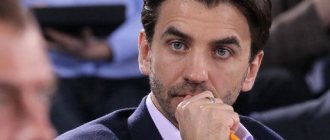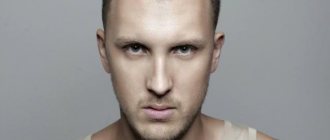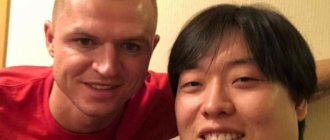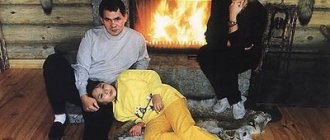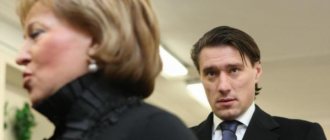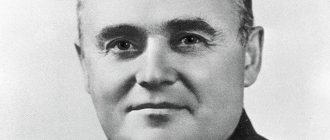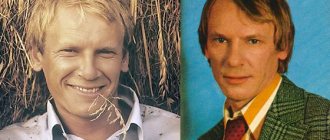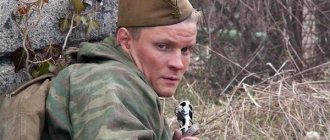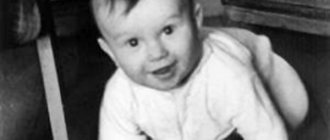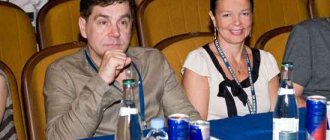Biography
Nikita Tarasov is originally from the Baltic states. He grew up in a creative family, his father is a professional musician, played in the group “Natural Product”, was also a member of the VIA “Eolika” and “Jolly Fellows”, worked in the band of the famous singer Nikolai Gnatyuk.
Mother worked as a design engineer in the bureau of the Riga Carriage Works.
Nikita recalls: “At the age of 13, my grandfather, sitting in a tractor, plowed virgin soil. On my mother’s side (our entire family) - from the Tver province. It so happened that I grew up in the Baltics, in Riga. My father is an artist, musician. Upbringing, of course, had an effect. Since childhood, I understood that I would be an artist, not an engineer. My father is a dandy. Maybe it’s only my taste in clothes and appearance in general that distinguishes me from others.”
The future actor made his stage debut at the age of three, when his dad bought him a guitar: “I was three or four years old. “Eolika” had a solo concert in the Dzintari concert hall. My father took me by the hand and led me out to the filled hall.” At the age of seven, Nikita appeared on television with his father - he starred in one of the episodes of the Morning Mail program. Since childhood, he studied music, played guitar and piano, and by the age of twelve he mastered the synthesizer. I started writing music and making arrangements. He hosted school parties and discos, and worked as a DJ at a radio station. He was going to become a singer or musician, but chance changed everything - his fate was decided by a meeting with Oleg Tabakov. Tarasov says: “When I graduated from high school, I had to make a decision - in Riga, at that time, you could become either a sailor or a bank employee. But I could be neither one nor the other. At school I had the nickname “Artist”: I led all the holidays, and I wrote all the music, all the arrangements. It was clear to everyone that I had to do something related to the stage. My girlfriend brought an advertisement in the newspaper - Tabakov is coming to Riga to recruit students for his course. Later I found out that I was the only one of all the Riga applicants without experience in the theater. Everyone played in school theaters for many years, studied with teachers, and seriously prepared for admission. I came “with a blue eye”, insolently. The only thing that really interested me then was when will I be able to sing? Naively believing that this would be enough.”
On his first attempt, the young man entered the acting department at the Moscow Art Theater School-Studio for a course with Oleg Pavlovich Tabakov, which he successfully graduated in 2002.
Personal life of Nikita Tarasov
Tarasov has not yet met his one and only. In his opinion, not many women can understand what the work of an artist is. He believes that few people would agree to marry a man who always disappears on film sets or in the theater.
In 2020, Nikita almost managed to arrange his personal life, he met a beautiful girl and was ready to propose to her, but the chosen one’s family was categorically against it. There is an opinion that the reason for such a sharp refusal was Nikita’s scandalous role in “Kitchen”.
Theater
While still studying, Nikita Tarasov began performing on the theater stage in the play “Amadeus”. By his fourth year at the Moscow Art Theater he was involved in three performances. "Amadeus", "The Antiquarian of Venice" and "A Midsummer Night's Dream". He also participated in graduation works: “Guilty Without Guilt”, “Krechinsky’s Wedding” and “Biloxi Blues”. After receiving his diploma, he joined the RAMT for one season. Then there was the Moscow Drama Theater named after K.S. Stanislavsky. The actor himself considers his best theatrical role as Epstein in the student production of “Biloxi Blues”: “But if you tie yourself by marriage to a repertory theater, then there is no relatives like the Moscow Art Theater and the narrow corridors in the basement on Chaplygin. It was there, on the Tabakerka stage, that the moments of flight, the real things that happened between me and my beloved partners were breathtaking. I do not hesitate to admit that there has never been a better role in my theatrical biography than the role of Epstein in the play “Biloxi Blues.”
Soviet hockey was not created by Tarasov. He invented this myth himself
The founder of Sports.ru Stanislav Gridasov released a huge book about hockey. One of the points is the bloated figure of Anatoly Tarasov. Nikita Petukhov clarified with him what was wrong with Tarasov’s place in history.
– I have a nice question to start with. We live in a paradigm: Tarasov, “Red Machine”, great Soviet hockey. What's wrong with it?
– You know, all these concepts appeared in different decades. And they were assessed completely differently by contemporaries. The “Red Car” is a rather late invention; Naturally, not ours. There was no tradition in the Soviet press to come up with any designations for troikas - such as, for example, KLM. One of the North American journalists took a tracing paper: “Big Red Machine” was the name of the Cincinnati Reds team, which had dominated American baseball since 1970. The first mention of the USSR national team, as far as I could find out, in this context happened in 1971.
In the USSR, such nicknames did not take root. And now this is a brand picked up by the new leadership of the FHR, which, in my opinion, has nothing to do with the original concept of the “Red Machine”.
This name was more suitable for the period when the USSR national team for ten seasons in a row, from 1963 to the 1972 Olympics, under the leadership of Chernyshev and Tarasov, did not lose a single major international tournament.
– “Didn’t lose” – this means not a single second place.
– Yes, we won all the world championships and all the Olympics. We have won all the major international tournaments. We won almost all the North American series (in 1963-1972, the national teams of the USSR and Moscow made several tours of Canada and the USA, playing against amateur and youth teams. And for the most part they really won - Sports.ru). Of course, this gave the impression of assembly line, mechanical, production of victories. Soviet hockey appeared in 1946, went through a number of generational changes, and now it does not exist. Despite the fact that many coaches who are now in the public eye come from Soviet hockey, what their teams play can no longer be called classic Soviet hockey.
– Is Tarasov the main person in the history of our hockey?
– Tarasov lived such a long life that this is a very big question. Let's try to break it down into parts. Keith Gave's book "The Russian Five" was recently published. There is the following phrase: “Joseph Stalin summoned Tarasov and ordered him to create Soviet hockey.” Most ordinary people treat her with complete confidence. But this is complete nonsense. The decision that Canadian hockey would develop in the Soviet Union - then it was called “Shinny”, as opposed to Russian “Bandy” hockey - [was made differently].
1945 Let's just imagine who Anatoly Tarasov was at that time. The war has just ended. Bandy has just returned, the USSR cups have begun to be played. He's not even 27 years old yet. One of the not the most talented players, not the most famous at all: before the war he did not have a big career, due to his age he simply did not have time. And to imagine that Stalin summons a 27-year-old, not the most leading player of one of the bandy teams, and orders him to create Soviet hockey - this is simply absurd. Tarasov was not at that time a figure with whom the General Secretary of the CPSU (b) could talk. This is out of the question.
I wouldn’t want my research and the future book, which will be about who and how Soviet hockey was actually created, to be perceived as something purposefully anti-Tarasov. It is not true. And I don’t want this to look like an anti-Tarasov anthem. The task is to return other names that have been forgotten.
– How was it really?
– Tarasov was not the main figure at the time of the birth of Soviet hockey. In terms of the organizational launch of the machine, two other people were key.
This is Sergei Savin, who headed the football section and to whom, I say in a modern way, the Minister of Sports Romanov said: “Figure it out.” It was Savin who went to the 1948 Olympics in St. Moritz, Switzerland, to see live what the hockey tournament looked like. He brought a detailed report that hockey is one of the most popular and prestigious sports for spectators. It was Savin in St. Moritz who agreed on friendly matches with the Prague team LTC, essentially the Czechoslovakian national team.
When the first USSR championship was being prepared in 1946, where should he go to understand Canadian hockey? Of course, to the Baltic states. The Latvian national team then took part in the Olympics and world championships (before joining the USSR, independent Latvia fielded a hockey team at the 1936 Olympic Games and four world championships – Sports.ru). Edgar Klavs, a very respected pre-war hockey player, was there. He gave Savin a real stick and a puck, and quickly translated the rules of the game into Canadian hockey. Many of the referees in the USSR championship were from Lithuania, Latvia and Estonia, where they knew hockey even before the war. In 1948, LTC, the strongest team in Europe, came to us. There are documents where exactly Savin is indicated as the person who is obliged to prepare the training camp, study the opponent’s composition, ensure his stay, and draw up analytical reports. Tarasov at this moment is one of five or six playing coaches. Savin is an official and at the same time a judge, the most authoritative person since the pre-war years.
The second is Pavel Korotkov. This is a pre-war legend of football and bandy. He was the first coach of the CDKA hockey team and headed the Canadian hockey section of the All-Union Sports Committee. Korotkov is also a figure who in 1948 was absolutely incomparable with Tarasov. Honored Master of Sports, a person who has great victories in football and bandy behind him. A man with huge connections in the Soviet sports world. His own younger brother, Alexander Korotkov, is one of the most secret and most effective agents of our intelligence. During the war, he was engaged in the liquidation of opponents of Soviet power. And after the war, he was actually the informal curator of the creation of the GDR.
Pavel Korotkov
When you read publications about matches with LTC and look at documents from those years, there is no special role for Tarasov. Apart from the fact that the Babich-Tarasov-Bobrov trio stands out on the field, there are no other mentions either in the Soviet, or in the Czech, or in any other press. In the early 60s, Tarasov was in a precarious position. He lost three tournaments as a head coach. He was fired from CSKA after a riot among hockey players. Dismissed from the team. Removed from the coaching council. And when he was just returned to the national team, returned to CSKA, he recalled the matches with LTC very modestly: “We, as part of the coaching council, which included” - and a list of names.
In the late 60s, “we” turns into “I.” “I” was called, “I” insisted, “I” went into the office and proved that we should continue playing with the Czechs, “I” was asked to sign that we would not lose to the Czechs. The period from “we” to “I” is the period from the early sixties to the late sixties. He passed it during those very ten years when the USSR national team did not lose a single major tournament.
– Why is it that out of all these names only Tarasov’s name remains?
“He was the first to understand how important it is to be friends and communicate with journalists. Tarasov, while still a player, began to watch matches of other teams. Each review included criticism of the other teams' coaches, rosters and tactics. Here, for example, “Spartak” - “Wings of the Soviets”, report dated December 20, 1947 in “Soviet Sport”. Spartak won 2:1. By the way, his brother Yuri Tarasov was playing in Spartak at that moment. [Here is what he writes] about Spartak: “Any system of play built on individual principles in our sport is doomed to failure.”
On February 10, Spartak beats Dynamo Moscow – 7:4. Arkady Chernyshev, Dynamo's player-coach, is trying a new tactic. Tarasov writes: “The tactical novelty - “three defenders, two attackers” is not only unsuccessful, but also, in principle, vicious for a high-quality team. "Dynamo's attack doesn't help the defense well." [Report in the magazine] “Ogonyok”: Tarasov was almost the first to let journalists into the locker room before the match. The report describes how Tarasov communicates kindly with the players and gives wise tactical advice.
Around the end of the sixties, North American journalists realized that Chernyshev somehow did not strive [for fame], did not write books, did not write articles, did not strive to talk to journalists. And Tarasov is always open. He, not knowing any language, is always ready to give interviews through translators.
He was the first to write books for the Western market. [It was published] in Sweden, in North America, where they no longer hesitated to write on the covers: “Secrets, methods of Soviet hockey from its architect Anatoly Tarasov.” Nobody takes away his innovation. But it must be said that in his books he almost never mentioned those with whom he started - or mentioned them pejoratively.
– In the book and texts you constantly remind us that the late Tarasov rewrote history. The most striking example.
- Let's look at young Tarasov. During the 1946 season, he was the player-coach of the Air Force football team. Wins the first league, advances to the tower. He is not yet 29 years old. In July 1947, Vasily Stalin returned from the combat brigade and received an appointment in the Moscow Air Force district. He has not yet become Commander-in-Chief of the Moscow District Air Force, but informally the whole sport is already under him. He receives his appointment in July. In August, Tarasov Air Forces play four home matches in a row and finish the series 1:5 against Dynamo Tbilisi and 1:6 against Traktor Stalingrad. Tarasov immediately resigns. His versions of [why] have changed greatly over the years. In the 40s he says one thing, in the 50s he says something else. In the 60s, when truly big victories came to him, he stopped being shy. And by the 70s, when he was already simply the father and founder of Soviet hockey, he was not shy about anything at all. Tarasov’s version: “I wanted to play with young football players, but Stalin demanded quick results, and he and I did not see eye to eye.”
This is a typical mistake for any person who reads about the Battle of Kalka or the conflict between Vasily Stalin and Anatoly Tarasov and applies modern standards to a time when the system of relations was built completely differently. That is, if you now talk about the conflict between the boss, the team’s patron, Vasily Stalin and Anatoly Tarasov, for people it will sound like “well, Vasily Stalin and the great Tarasov did not see eye to eye on the development of the Air Force football team.” As if Evgeniy Giner and Viktor Goncharenko did not agree on the player’s understanding - to buy this one or bet on another.
But it's 1947. The son of the Generalissimo, one of the five most influential people in the country and a young coach, master of sports. Moreover, the status of the coach at that time is not comparable to the status of the coach now. The coach was almost never mentioned in publications back then. More often the team captain was indicated. And to imagine that a 29-year-old aspiring coach was arguing with the son of Stalin himself in 1947 is complete nonsense. This is impossible.
Vasily Stalin
– Who, besides Savin and Korotkov, whom you have already named, are the main heroes of that era?
– Of course, Arkady Chernyshev. Vladimir Egorov, the creator of “Wings of the Soviets”, who at that time were number 2-3 in Soviet hockey. The man who was Chernyshev’s second coach at the victorious ’54 World Cup and ’56 Olympics. And when Chernyshev was fired in 1957 after a defeat at the Moscow World Championship, Tarasov, who became the head coach, first of all called Egorov as an assistant. This says something.
Alexander Igumnov, first coach of Spartak. Alexander Novokreshchenov, state hockey coach of the USSR, the man under whom Spartak won the first gold medals of the USSR hockey championship in 1962.
Pavel Savostyanov, founder of the hockey department at the State Center for Physical Culture and Physical Culture, who worked there from 1949 until his death in 1974. The department now bears the name of Tarasov. Bobrov, of course. Because he was a player of such a level and influence that he sometimes outweighed any coaching ideas.
We can talk about the important influence of Latvian hockey players - Edgars Klavs, Arvid Petersons, who was both a player and a teacher, as we say, at the Riga Institute of Physical Education. This is the main circle.
– You write about Vladimir Egorov that after losing the 1960 Olympics, Tarasov brazenly leaked him.
– It is important to understand what the very first generation of ice hockey players were like and how much they differed from modern athletes. And it's not about salaries. The leading players of those years allowed themselves no less. There are documented stories when a person with an official salary of 1,600 rubles a month left 4 thousand in a restaurant for an evening. So that's not the difference.
Some of these people went through the war, others were children of the war or post-war children, often growing up without fathers, in dysfunctional families, in disadvantaged areas. Most of them are heavy drinkers. This is no secret, there are many stories on this topic. There is a record in the KGB archives that Sologubov and Tregubov showed up on the train that was leaving for the 1955 World Cup in Germany, terribly drunk. These are two leading defenders of the USSR. But who is Sologubov? This is a front-line soldier. According to some sources, he was a past penal battalion. He had a gunshot wound and his tibia and fibula were broken. The man drank as much as current and previous generations could not even dream of.
It was difficult to yell at these people, it was difficult to command them. God forbid I somehow swear. Why am I telling this? In the late 50s, Krylia Sovetov was one of the main suppliers of players for the national team, no less than CSKA. The same thing happened at the 1960 Olympics in Squaw Valley, where we took third place. It became Tarasov’s third consecutive defeat as the head coach of the USSR national team after the 58 and 59 World Cups. This led to a trial first with the coaching council. And in the spring, a coaching conference was convened, which was supposed to globally discuss the problems of Soviet hockey.
Unfortunately, I did not find the materials of this conference in the archive. I listened to a retelling from a person who was present. It actually said: “These bandits are from Krylya Sovetov, it’s impossible to deal with them, they don’t correspond to the modern level of hockey, they are absolutely uncontrollable,” and so on. You can believe this or not, but in fact - after that conference, not a single player from “Wings of the Soviets” of this generation was ever called up to the USSR national team. Naturally, there was no official ban; this was an informal decision, which was certainly influenced by Tarasov.
– Another cool story about Tarasov is how he dragged the Canadians to a friendly match in Kalinin to start a fight.
- This is a confirmed story. 1965, when the USSR national team dealt with Canadian amateur teams almost without problems. This is no longer 1957, when we first came to Canada, saw an NHL game for the first time, played against amateurs for the first time. The game actually took place in Tver (from November 20, 1931 to July 17, 1990 - the city of Kalinin - Sports.ru). It is still not documented whether these were backup team members of the USSR or CSKA. Indeed, Tarasov decided to teach the Canadians a lesson, since there were different rules in martial arts and indeed the Canadians played roughly. Tarasov decided to give the Canadians a demonstration fight, where everything was rehearsed. At his command, a fight began and the Canadians were swept away. But, according to legend, Tarasov also said: “Tell me further that you can’t bully us.”
– An important part of your research is whether Tarasov sought a meeting with the Canadians and whether his efforts led to the Super Series-72.
- There are two lines here. Line one. 1957 is the first year when he officially works as the head coach of the USSR national team. This is the first trip for any team from Europe to Canada. There is a legend. I dug through the Canadian press of 1957 from Ottawa, from Montreal, but could not find this phrase documented. This phrase exists only in Tarasov - that Maurice Richard, the legend and main star of the Montreal Canadiens and the NHL in general of those years, watched on TV the very first match between the USSR national team and Whitby Dunlops, which took place in Toronto. We lost 2:7.
In general, this was a unique story for Canada: the friendly match is shown live throughout the country. And the report on this match in Canadian newspapers took up more space than reports on regular NHL matches. A huge article in Sports illustrated, probably in a bunch of magazines that I simply haven’t seen. And allegedly Maurice Richard, sitting at home watching TV, said to someone in an interview: “What kind of hockey is this? A pointless waste of time, this is the kind of hockey my dad played in the 30s.” Perhaps Richard said something similar. Perhaps someone in Canada retold this phrase to Tarasov. It is unlikely that he invented it, very unlikely.
The internal dialogue with Maurice Richard, if you read Tarasov’s books of the 1960s, is a painful point for him. He argues with him in all the books. He proves to him in Russian that, Maurice, you are wrong, Maurice, I saw your Canadian hockey, your hockey is individual. The idea of Soviet collectivism in Tarasov manifests itself in the very first notes of 1946. And it runs through his entire life, through his entire concept. That is, Soviet collectivism on the court versus Canadian individualism as the most advanced and most promising method of hockey development.
Maurice Richard
Line two, and this is clearly a mythological story, for which there is no documentary basis. 1964, the Winter Olympics ends. And Nikita Khrushchev, then still the Secretary General, holds a reception for the Olympians, at which the USSR national hockey team is present. And there was Yuri Gagarin, who loved hockey. And in classical mythology it is described like this: Khrushchev got a little tipsy, Tarasov and Chernyshev approached Gagarin, they said, let’s go to Khrushchev and persuade him to play with professionals. We have already defeated everyone in Europe, we are ready to reach out to the Canadians.
Apart from the words of Tarasov, who retells this in different ways in his books, there is not a single confirmation. I called the author of Gagarin’s ZhZL, I called Chernyshev’s son. I tried to check from different angles how true this was – this meeting, this request.
Let's analyze the situation like hockey. We are losing the World Cup 57, World Cup 58, World Cup 59, World Cup 60, World Cup 61. Five tournaments in a row. We are skipping the 62 World Cup for political reasons. We win the 63 World Cup based on the best goal ratio. There can be no talk of any hegemony in Europe by 1964. We just had a generational change. We just learned how to win against the so-called amateurs. But at the 67 World Cup in Vienna they beat everyone with a total goal difference of 58-9 - including Canada, which included veteran defenseman Carl Brewer, a three-time Stanley Cup winner. After this, these memories begin to develop that we “were ready to play with professionals for a long time.”
We believed that the Canadians, from a high bell tower, were spitting on defeats somewhere in leftist tournaments. [This is wrong]. Already in 1954, when we defeated a team from the second league of the province of Ontario 7:2, Conn Smythe actually sent an official challenge that he was ready to field the NHL club Toronto Maple Leafs against any of our teams: “I am ready to play as long as I want, against any team to prove that this is all an accidental mistake, the strongest Canadian hockey is here.”
At the same time, the Canadians were terribly outraged that our hockey players received $1,250 for winning the World Cup, when the team bonus for the Stanley Cup was $1,000 for everyone. Defeat at the '56 Olympics is an even more painful blow. There is a letter from the Penticton Wiz - these are the guys who defeated us in the 1955 World Cup - they were very offended that we became Olympic champions and wrote a letter. Calls came regularly.
In Tarasov’s books, the refrain “the Canadians did not want to play with us” constantly sounds. Bullshit. They were very nervous about any defeat, especially at the Olympics.
Secondly, their so-called amateur teams. Let's take a look: There are only six teams in the NHL. At that time they played five defenders, three three forwards, two goalkeepers. There are no Europeans yet. 120-140 selected hockey players among all graduates, all Canadian schools throughout North America. This is the elite of the elites. A person who did not make it to the NHL, but plays in an amateur team, is in no way lower in level than graduates of our sports schools.
When our team came to play with amateur teams in 1957, they were blown away by the level of organization. Yes, indeed, people combined work with hockey. But the level of the training process was no lower than that of the USSR national team. Tarasov and Chernyshev, as experienced and intelligent people, understood this perfectly.
In 1969, the Canadians finally realized that the feint of converting some professionals into amateurs no longer worked; the USSR national team still beat everyone. The 70 World Cup should be held in Canada. And the Canadians don’t want to lose. Then they put a requirement on the IIHF that a certain number of players with professional status be allowed to attend the World Cup in Canada. This issue is being submitted to a collegial decision by the International Hockey Federation, to which the representative of the Soviet Union, Andrei Starovoitov, is attending. He had a translator, the well-known and still living journalist Vsevolod Kukushkin, who was personally present at these meetings.
Starovoitov could not go with a personal opinion. He went with a consolidated opinion, which was agreed with the coaches of the USSR national team, and with the party, and with the coaching council, and with the Ministry of Sports. According to Kukushkin, Tarasov said that professional Canadians should not be allowed in under any circumstances and that the Soviet Union should vote against it. This is indirect evidence. Starovoitov did not like Tarasov. Minister of Sports Pavlov did not like Tarasov. Let's assume that this is a slip of the tongue.
But in 1969, negotiations began on holding the 1972 Super Series, which were already conducted unofficially by the NHL trade unions. The approach was made very cunningly. Alan Eagleson is a representative of the NHL trade union organization. For our people, this was presented in understandable Soviet terminology. What are trade unions? These are the interests of workers against capitalists. This was understandable logic for the party and the Soviet government. Negotiations have been in full swing since 1969.
Tarasov could not have known about this. What is he doing at this time? Published a huge article in Komsomolskaya Pravda in January 1970, called “Is this hockey?”, in which he critically breaks down the tactics and manner of play of the NHL. A person who wants to play with professionals writes an article like this?
Leading journalists of that time - Vladimir Dvortsov, Evgeny Rubin, Nikolai Ozerov - were unanimous that Tarasov actually declared a desire to play with professionals, but was afraid of it. I would like to clarify this wording. Tarasov certainly really wanted to play with professionals. All these books from the 1960s, the endless internal dialogue with Maurice Richard, his incredible happiness at beating Karl Brewer. A new large generation has yet matured here - Mikhailov, Petrov, Kharlamov, Tretyak, Gusev, Yakushev. These are no longer Alexandrov, Almetov, Loktev, Mayorovs, Starshinovs, who became famous in the 1960s. This is the third great generation of players who have already beaten the Canadians since their youth. They didn't have this fear.
There is a mixture of great desire and understandable fear of losing. You've been beating amateurs for ten years. You have titles, money, party awards, fame, honor, respect. And suddenly you come and get 0-8 in the series. Nobody knew how it would turn out. And that's all - a shame for life. And all your previous 10 championships will fade.
– Why, by the way, do you say that ten victorious years are Tarasov’s? The head coach of the national team at that time was Chernyshev.
– I gave an example that while still a player, since 1946, Tarasov wrote articles every year, every month in “Soviet Sport” and other magazines. Then he published many books during the 1960s, where he described his contributions, his ideas, his influence, his views on the development of hockey. During this time, Chernyshev did nothing to somehow communicate with journalists.
Tarasov was not shy in this sense. 1957, World Cup in Moscow. Due to the events in Hungary in 1956, Canada is not coming. We are the winners of the 1956 Olympics, we believe that gold is automatically in our pocket. We smash everyone. We play a draw with the Czechs. And we have a decisive match with the Swedes, a very good team. It ends 4:4, and we lose the gold medals to the Swedes. Essentially, it's a matter of one abandoned puck. Tarasov writes a huge article, in my opinion, in the magazine “Sports Games”: tactical mistakes, wrong choice of squad. “Grebennikov is a mediocre player.” This is the same Grebennikov whom he himself will take to the national team, one of the best scorers of the USSR championship in history, who, like Bobrov, said “Give me the puck, I’ll beat CSKA alone.”
Tarasov writes: “Under Chernyshev, the enemies of our sport penetrated into the national team - caution and passivity. And the “nil in own goal” theory does not meet the requirements of offensive tactics, reduces the attacking impulse of our youth, limits and impoverishes the players’ capabilities.” It's 1957, only four years have passed since Stalin's death. In the genetic memory of this generation, the word "enemies" has a very clear connotation. Tarasov, if you trace his articles of those years, always provided an ideological basis for what he considered tactically incorrect. Chernyshev did not do this.
– You repeat more than once that it is important to understand how it really happened. In fact, it was then that Chernyshev was in charge, and Tarasov was second?
“They would not have worked successfully for ten years together if they had not found a common language and division of responsibilities. They were completely different in temperament. Tarasov is ebullient, Chernyshev is calm. Tarasov is a party member, with the nickname “Trotsky”. This is also usually not written about. Imagine, [Tarasov] had the nickname “Trotsky,” given to him either from a Lenin quote or from a popular expression. Chernyshev was a non-party member.
Arkady Chernyshev
Tarasov came up with a lot of different physical exercises on earth. According to his recollections, no training session was really similar to another. Many players with whom I talked still retell the story: “Tarasov personally approached Khrushchev with Gagarin,” “if we had played with Tarasov in 1972, and not with Bobrov, we would definitely have beaten the Canadians.” Firsov was absolutely devoted to him and that is why he did not take part in the 1972 Super Series.
Then a generation of old people left - Sologubov and others, who kicked Tarasov out of the team in 1961. We got together, called the authorities from the ministry and said that Tarasov and I didn’t want to work anymore. The new generation, raised by Tarasov, was very devoted to him. At the same time, Chernyshev was clearly no worse as a tactician. Calmer, more balanced, wiser. Witnesses say that he often confronted Tarasov during matches. They even dressed differently; it is clear that Tarasov often wore tracksuits, an army emblem, and a cap. And Chernyshev - a coat-coat.
When we talk about the phenomenon of Soviet coaches, be it Egorov, Tarasov, Chernyshev, Lobanovsky, Gomelsky, Beskov - none of them can be imagined as such angels of sports who live only for them. Sych’s denunciation mentions that Chernyshev also intrigued against Bobrov. None of them were quiet and docile.
It is generally accepted that Chernyshev and Tarasov were removed from the team after the 1972 Olympics in Sapporo due to the machinations of their superiors, but this is not so. Yes, both Starovoitov and the Minister of Sports Pavlov did not like Tarasov, but they left on their own, voluntarily. As Boris Chernyshev told me, his father and Tarasov had an agreement to work out the 1968-1972 Olympic cycle and then leave the national team. Of course, they later regretted it when they learned about the decision to hold the Super Series-72, but already in Sapporo our entire team knew that this was the last tournament for Chernyshev and Tarasov, and the new head coach Vsevolod Bobrov was already sitting in the stands.
Chernyshev, Tarasov and Bobrov
– You write very briefly that Tarasov was in conflict with two key figures in Soviet hockey, Bobrov and Tikhonov.
– These things are not documented. They are written down in someone’s words, memories, that is, they are not a strict fact. Standard mythology says that during the 54 World Cup - by that time Tarasov and Bobrov were not on any terms - Tarasov said something like “let’s not waste energy on matches with the Canadians, the Canadians are not ashamed to lose, everyone loses to them, let’s save energy, Let’s calmly take the European Championship.” And allegedly Bobrov was indignant and said - no, we will play to win. This is such an apocrypha.
But there is another apocrypha that may turn out to be true. They lived in the same house. It is clear that they had cars, like high-ranking coaches. The entrance and exit are narrow; Tarasov enters on one side, and Bobrov on the other. And they stood like two sheep, opposite each other, and no one wants to give way to anyone. One can easily believe such a story.
This is a quarrel between people, it can be instantaneous. Or it can accumulate and not come to the surface for years. And at some point it will break out because of bullshit. In fact, what can you say. The troika, where Tarasov played in the center, and Bobrov and Babich on the edges, was absolutely the strongest in the early years of Soviet hockey. And Tarasov organized the actions of both the wingers and his defenders. In addition, he was a player-coach.
It is quite obvious that for Bobrov the status of a coach was not as important as for Tarasov. Bobrov, whether in football or hockey, had such a unique talent, incomparable to any of his Soviet contemporaries, that for him the tactic was “give me the ball, I’ll do everything myself.” And as a rule, he did it. He had a conflict with Viktor Shuvalov, who instead of Tarasov in the Air Force made up the trio that later won the 54 World Cup. Everyone is used to the fact that if Shuvalov, Bobrov and Babich skate together, the puck will go to Bobrov. Shuvalov pretended that he would pass it to Bobrov, but gave it to Babich. Babich abandoned it. Bobrov was angry and upset. Next attack. Shuvalov shows that he will pass it to Bobrov, dribbles around the defender, the goalkeeper, and throws the puck.
Bobrov gives Shuvalov a beating. At the same time, Bobrov and Shuvalov had the tact to spend many years in the same trio, somehow curbing their ambitions for the sake of overall team success. This apparently didn’t work out for Bobrov and Tarasov.
And here is the last important point in this story, which is retold in different ways. World Cup-54. Until this moment, we have three coaches who go to training camps, to different tournaments, in a not very clear, identical capacity, where there is no division - senior, middle or welterweight coach. Chernyshev, Tarasov, Egorov. Since 1949, there have always been three of them. I have three papers, three draft lineups for the World Cup in Stockholm. In one paper, Tarasov is the senior coach, Chernyshev is the second. In the second paper, Chernyshev is the senior coach, Tarasov is the second. The third paper is dated a week before leaving for Stockholm; something happened at the last moment. I think that the phrase attributed to Bobrov – “Either me or Tarasov” – is most likely not true.
In fact, Tarasov was the head coach of the USSR national team in 1953, when Bobrov did not play due to injury. When Bobrov returned to the national team, any boss understood that there was a clear open conflict between Tarasov and the undisputed leader. Bobrov will not listen to Tarasov's instructions. And next to us are two experienced and more tactful coaches. This is a normal managerial decision: you have two coaches equal to Tarasov and there is a leader who is at odds with the potential head coach. Logical resignation. Why did they quarrel? Who knows, we'll never know.
– Is there anything about Tikhonov other than Tarasov’s letter in support of Fetisov?
– The Tikhonov period is another unbeaten streak for CSKA. These are two blows to Canadian hockey that greatly changed the attitude of Canadian coaches and Canada in general to the game of hockey - 6:0 in 1979 and 8:1 in the 1981 Canada Cup. That's two huge blows. Tarasov could not look calmly at Tikhonov’s successes simply because of his character.
During perestroika, a wave of letters from Larionov, Fetisov, and Starikov’s wife began against Tikhonov’s methods. Did Tarasov have less barracks-like methods? Didn’t Tarasov throw out veterans at the age of 27? Is Tarasov somehow different from Tikhonov in terms of intensity of training, closing down players, and pressure on the team? The methods, of course, were different, but there is no global difference between them.
And we are now considering the era of Tikhonov. But in 1978, it was hanging by a thread. After two defeats, we played in Prague, our enemy. If we don’t win by two goals, then the Czechs are champions. We won – 3:1. But everything could have turned out differently. And Tarasov was nearby: if anything happens, I’m ready to help, I’m ready to advise.
Now we almost perceive Znarok as a young coach who has a lot ahead of him. And he won the 2018 Olympics at 55 years old. Tarasov [when he finished hockey] was younger.
Stanislav Gridasov’s book “Crystal People” can be purchased on the website of the publishing house “Fifth Rome” and in online stores: Ozone, Labyrinth, Read-Gorod.
Photo: RIA Novosti/Melkumyan, Yuri Somov, Boris Kaufman, Alexander Makarov, Dmitry Donskoy, Vladimir Grebnev; commons.wikimedia.org/National Archives of Canada; johndonne.ru; ice-hockey-stat.com, State Archives of the Russian Federation
Cinema
Nikita Tarasov began acting in films in 2000. The young actor was invited to play a small role in the comedy “Vovochka”. Then he played in the serial film “Lady Boss”. Gradually I began to receive invitations from directors with enviable consistency. The artist worked in such projects as “Moscow Saga”, “Yesenin”, “Island”, “The Story of a Pilot”, “First Attempt”, “Christmas Trees”, “The Life and Adventures of Mishka Yaponchik”, “Katina Love” and many others. In 2012, he was invited to play the role of French pastry chef Louis Benoit in the sitcom “The Kitchen”. Tarasov's hero appeared in every season of the comedy series, and later appeared in several full-length parts of the film. Participation in the filming of the “Kitchen” project allowed Nikita to become a popular and sought-after actor in Russian cinema. “At the time of the launch of “Kitchen”, no one thought about such a success of the project. Who would have thought that in four years I would learn how to make eclairs and understand that Tarte Tatin and Tarte Amandine are not the same thing at all? The image of Louis that the viewer saw was not a figment of my sick imagination, but an acting compilation of famous confectioners, whose master classes I watched a dozen,” notes the artist. Tarasov, whose filmography already includes more than nine dozen films, also participates in numerous TV series: “Find a Husband in the Big City”, “Trust Me”, “Citizen Katerina”, “Crisis of a Tender Age”, “A Woman Without a Sense of Humor”, “Intimate Parts”, “Battle for Sevastopol”, “Monk and the Demon”, “Ikaria”, “Attraction”, “Fizruk”, “Flying Crew”.
"Draft"
In 2020, Nikita received an invitation from director Sergei Mokritsky to the fantasy series “Draft”. Screen adaptation of the novel of the same name by science fiction writer Sergei Lukyanenko. The creative team of the film included: Nikita Volkov, Evgeny Tkachuk, Olga Borovskaya, Severiya Janusauskaite, Evgeny Tsyganov, Yulia Peresild, Elena Yakovleva, Andrey Rudensky, Irina Khakamada, Andrey Merzlikin, Yang Ge, Dmitry Khrustalev.
Career
After successfully graduating from the Moscow Art Theater School in 2002, Tarasov played a season at RAMT, and then joined the troupe of the Stanislavsky Theater. At the same time, he put together a musical group that successfully performed in the capital’s nightclubs and corporate events and performed music of his own composition.
Nikita Tarasov in his youth
Tarasov’s film career began in 2001, during his last year of study, with a cameo role in the TV series “Lady Boss.” Two years later, he played one of the central characters in the 4-episode detective story “The Taste of Murder.”
One of the first roles of Nikita Tarasov
Over the next 10 years, he starred in 25 very diverse projects. Among them were the series “Yesenin” with Sergei Bezrukov, where Nikita played the poet’s friend, Sergei Gorodetsky, and “The Island” by Pavel Lungin (the role of a young priest), and the comedy “Yolki” (the role of a doctor).
Nikita Tarasov on the set of “The Island”
Viewers remember his futurist poet Syoma from the multi-part biopic “The Life and Adventures of Mishka Yaponchik” with Evgeniy Tkachuk, and the actor Yurochka Uksusov from the ironic “Detective Samovarov”. The actor was in constant search of his director, his role, striving for constant creative search, he took on any genre.
On the set of the series “Yesenin”
However, the general public remembers Nikita primarily as the peace-loving and calm French pastry chef Louis from the hit STS series “Kitchen”.
Nikita Tarasov as pastry chef Louis from “Kitchen”
For the role, Nikita had to improve her French, which was limited by the program of the Moscow Art Theater School, in order to achieve perfect French pronunciation, as required by the director. And in between filming, Nikita often traveled to his hero’s homeland, deliberately visiting provincial towns where everyone only spoke French.
Still from the film “Kitchen: The Last Battle”
Louis has appeared in all seasons of The Kitchen, as well as in the feature films Kitchen in Paris (204) and The Kitchen: The Last Stand (2015). Also, the character of Tarasov returned to the screen in the second season of the spin-off of “Kitchen” - the series “Hotel Eleon”. Nikita Tarasov answers questions from the viewers of “Kitchen” After “Kitchen”, Nikita Tarasov became fond of the comedy role. But he cannot be called an actor of a purely comedic genre. Proof of this was his role as military doctor Boris in the epic film “The Battle of Sevastopol.” Nikita and his colleagues on the set - Yulia Peresild, Oleg Vasilkov, Natalya and Sergei Mokritsky - were awarded a government prize.
Still from the film “Battle for Sevastopol”
Then there was a role in Nikolai Dostal’s intellectual comedy “The Monk and the Demon” with Timofey Tribuntsev, in which Tarasov played Tsar Nicholas I. In 2020, he could be seen in Fyodor Bondarchuk’s blockbuster “Attraction” - the role of deputy Poleskin was small but memorable.
“The Monk and the Demon”: Nikita Tarasov as Nicholas I
Also in 2020, the actor took part in a new comedy project on the TNT channel “Love is..” along with the heroines of the popular comedy show “Comedy Woman”: Ekaterina Varnava, Natalya Yeprikyan and Marina Fedunkiv. The project was released in the format of a sketch show and was dedicated to the relationships between men and women.
The actor has a great sense of humor and inherent self-irony
Interview
Moscow
“I’ve been in Moscow for almost twenty years. It’s hard to imagine now that somewhere in another city I could realize myself so much. I spend, of course, most of my time in Moscow. If you imagine the structure of the human body, then Moscow for me is the brain, St. Petersburg is the soul, Provence is the stomach, Venice is the eyes and ears, Riga is the legs, simply because my roots are there. The hands haven’t been found yet, I’m still searching.”
Rest
“My father is a touring musician. Therefore, it is in our family’s blood to work where we can relax. And vice versa: relax where there is work. The concept of “rest for the sake of relaxation” appeared in our country only last summer. My dream came true: I took my parents to a place where I had been more than once - to Provence, in the south of France. And I had the pleasure of taking a tour of the pastry chef Louis’s native place... The next dream is to go to Venice together. After all, this is the cradle of all creative people on the planet. This is where inspiration awakens. It so happened that I met my age as Christ, 33 years old, on the set in Venice. On the island of San Michele, at the grave of Joseph Brodsky. Last year, while taking part in the feature film Ikaria, we had a great time in Malta. But again, a trip with the family to the sea is complicated by the fact that the parents live not far from Jurmala. You wake up and within fifteen minutes you’re already on the coast. And it's good there too. One continuous happiness."
Cooking
“It would be a sin not to do this, because for five years we stood shoulder to shoulder on the set with professional chefs. They taught us a lot. Today, in any restaurant kitchen in any city, I feel at home. I know where the ingredients are, where the refrigerator is, where the spices are, where the warehouse is... I really love cooking and eating seafood in any of its forms. I also prepare salads, I can stew meat. And a separate article is breakfast. Not everyone has a clear perception of oatmeal. But if you add ice cream and cinnamon to it, the usual dish will become more attractive. I really love cheesecakes with raisins! Or an omelette with red fish, avocado and feta cheese... Breakfast is the most important thing for me. Because dinner at the movies is sometimes “flowing.” That is, when it works out.”
Friendship with colleagues
“Of course, I communicate. Where do these stereotypes come from? Who else will understand you better than your colleagues? Work flows into friendship. And it’s even better when a creative brainchild is born in friendship. It is difficult to find people in cinema who do not live by their work. This is akin to healthy fanaticism. For example, in moments of laziness, the image of Yulia Peresild comes to me in my mind. Like, “I manage to do everything, and don’t sit still!” The fact is that, having received an invitation from Yulia to play in the play “Poem,” I saw with my own eyes what a huge burden she responsibly carries on her shoulders. In addition to filming and performing in repertory theaters, she has been involved in charity work for many years. Such an example is contagious.” Based on materials from the sites: kino-teatr.ru, kinopoisk.ru, tvperson.ru, vokrug.tv, womanhit.ru, fb.ru, piterzavtra.ru.
Movies
Actor Nikita Tarasov has about 50 works in films and television series. The actor’s creative biography began in 2001: Tarasov appeared as a young groom in the vaudeville comedy “Bad Grandma.” Subsequently, he constantly changed his role. Nikita appeared before the viewer in a wide variety of images: from a charming intellectual to a merciless villain, from a touching doctor to a maniac killer, from a vampire to a transvestite.
But the actor earned all-Russian popularity in 2012 after participating in the comedy sitcom “Kitchen,” where he plays the French pastry chef Louis, who works in the Moscow restaurants “Claude Monet” and “Victor.” The image of a spoiled and shocking master of cakes and pastries was a great success for Nikita Tarasov, and in addition, he revealed the comedic potential of the actor. To add realism to his character, Nikita, before filming began, went to Provence, where he specifically tried French desserts and even went into the kitchens of restaurants and pastry shops in order to see the work of real chefs.
In 2020, Tarasov starred in the Ukrainian-Russian military biographical drama “The Battle of Sevastopol,” which tells about the Soviet sniper Lyudmila Pavlichenko. Nikita played military doctor Boris Chopak and, together with the film crew, visited the most heroic places of Sevastopol, Odessa, Kyiv, Kamenets-Podolsky. The film received high marks from the jury of festivals in Cannes, Berlin, Toronto and Odessa. Russian film critics call this work the best Russian film about the Great Patriotic War in the last quarter of a century, and Tarasov’s performance is sincere, convincing and ideally consistent with the principles of an intellectual of the mid-20th century.
Filmography: Actor
- Cool Crew-2 (2019), TV series
- Draft (2018), TV series
- Not them (2018)
- Script (2018)
- One Hundred Days of Freedom (2018)
- Call Center (2018)
- Ikaria (2018)
- I'm going to save people (Azerbaijan, Russia) (2018)
- Intercessors (2018)
- Abigail (2018)
- House arrest (2018)
- Viy-2. The Mystery of the Dragon Seal (China, Russia) (2018)
- Draft | Rough draft (2018)
- Flight Crew (2018), TV series
- Sotka (2018)
- From the Other World (2018)
- Fizruk (2017), TV series
- Frontier (2017)
- Rock | Fate (2017)
- Recipe for Love (2017)
- Attraction (2017)
- Papa Dan | Tato Den (Ukraine) (2017)
- Hotel Eleon (2017), TV series
- Kitchen. The Last Battle (2017), TV series
- Queen in Performance (2017)
- Moscow. Central district. Final season (2016)
- The Monk and the Imp (2016)
- Tender Age Crisis (2016)
- Journalists (2016)
- Josephine and Napoleon (2016), TV series
- Woman Without a Sense of Humor (2016)
- Hotel "Russia" (2016), TV series
- Breakfast at Dad's (2015)
- Citizen Katerina (2015)
- Battle for Sevastopol | Nezlamna (Russia, Ukraine) (2015)
- Ostrog Nature Reserve (2014)
- Kitchen in Paris (2014)
- Trust me (2014)
- Caesar (2013)
- Studio 17 (2013)
- Find a husband in the big city (2013)
- Kukushen (2013)
- Private parts (2013)
- Kitchen (2012-2015), TV series
- Do not Cry for Me Argentina! (2012-2013), TV series
- Baby (2012)
- Mistress of my destiny (2011-2012), TV series
- Katina Love (2011-2012), TV series
- Killer Profile (2011), TV series
- The Lavrova Method (2011), TV series
- Zhukov (2011)
- The life and adventures of Mishka Jap (2011)
- Cherkizona. Disposable People (2010)
- Detective Samovarov (2010), TV series
- Happy Together (2010), TV series
- Dreams of an Old Hotel (2010)
- Queen's Sisters (2010)
- Partisans (2010)
- Cop in Law-2 (2010)
- Enigma (2010)
- Christmas trees (film almanac) (2010)
- Angel on Duty (2010)
- Gangs (2010)
- First attempt (2009), TV series
- A Pilot's Story (2009), TV series
- Redhead (2008-2009), TV series
- The river is wide (2008)
- Crazy Angel (2008)
- Gypsies (2008)
- Heavy Sand (2008), TV series
- Save Our Souls (2008)
- One Night of Love (2008)
- Mission: Prophet (2008)
- D-Day (2008)
- Man Without a Gun (2007), TV series
- Olya + Kolya (2007)
- Room of Lost Toys (2007)
- Island (2006)
- Who comes on a winter evening... (2006)
- Bunker, or Scientists Underground (2006)
- Private detective (2005), TV series
- The last battle of Major Pugachev (2005)
- Non-duty task-2. Explosion at Dawn (2005), TV series
- Yesenin (2005), TV series
- Viola Tarakanova. In the world of criminal passions -2 (2005), TV series
- Airport (2005), TV series
- Adventurer (2005), TV series
- The Man Who Was Silent (2004)
- Beyond the Wolves-2 (2004), TV series
- Moscow Saga (2004)
- Jackpot for Cinderella: (2004)
- Dead Line (2004)
- Dreams of the Fifth Season (2003)
- Day Rep (2003)
- Taste of Murder (2003)
- Leading Roles (2002)
- Bad Temper Detective (2001)
- Russian Vaudeville (2001)
- Poor Granny (2001)
- Suspicion (2001)
- Lady Boss (2001), TV series
- Vovochka (2000-2004), TV series
Notes[edit | edit code]
- The invisible battle for ZakS (Russian). Leningradskaya Pravda (09.16.2002). Retrieved December 23, 2020.
- Will the speaker emerge from the fog? (Russian). Leningradskaya Pravda (December 24, 2002). Retrieved December 23, 2020.
- Ebralidze Alexander Iosifovich (Russian). Faces of St. Petersburg
. Publicity of St. Petersburg (02.10.2014). Retrieved December 23, 2020. - Tarasov Sergey Borisovich (Russian). Personalities of St. Petersburg
. Agency "Information Resources". - Business card. Retrieved December 23, 2020. - Tarasov, Sergey Borisovich.
Innovative development of the metropolis through scientific and educational potential. — Dissertation ... candidate of economic sciences: 08.00.05. - St. Petersburg: State Educational Institution SPbSPU, 2006. - 214 p. - Members of the Federation Council: “Representative from the executive body of state power of the city of St. Petersburg. Date of confirmation of authority: 05/30/2008. Expiration date: December 2011.”
- 257th meeting of the Federation Council: “By the decision of the chamber, the powers of members of the Federation Council Sergei Tarasov and Boris Listov were terminated early in connection with the transition to a new place of work.”
- Order of the Government of the Russian Federation of October 15, 2009 No. 1501-r “On the Chairman of the Board of the State Company “Russian Highways”” (unspecified)
(inaccessible link). Retrieved December 23, 2020. Archived December 23, 2020. - Order of the Government of the Russian Federation of October 15, 2009 No. 1474-r (unspecified)
(inaccessible link). Retrieved December 23, 2020. Archived December 23, 2020. - Ex-senator from St. Petersburg Sergei Tarasov died in the crash of the Nevsky Express (Russian). Fontanka.Ru (11/28/2009). Retrieved December 23, 2020.
- Ex-senator Sergei Tarasov died in the Nevsky Express (Russian). MR7 - News of St. Petersburg (November 28, 2009). Retrieved December 23, 2020.
- The senator from St. Petersburg decided to marry a ballerina, only 23 people were invited (Russian). Gazeta.SPb (September 9, 2009). Retrieved December 23, 2020.
- Sergey Borisovich Tarasov. Biographical information (Russian). Online publication "RIA Novosti"
. MIA "Russia Today" (11/28/2009). Retrieved December 23, 2017.
Sergey Borisovich Tarasov, biographical information
This man was born into a very ordinary family, far from politics. In the city of Frunze (which is now called Bishkek), Kirghiz SSR, July 15, 1959. His biography tells about this. Sergei Borisovich Tarasov was the son of simple parents. Mother worked as an engineer, father worked as a driver.
When the boy was 7 years old, the family moved to the Magadan region. In first grade, Sergei Borisovich Tarasov went to the local school in the small village of Pevek. After graduation, it was decided to receive higher education at the Leningrad Shipbuilding Institute, specializing in “Shipbuilding and Ship Repair”.
In 1982, he graduated from this educational institution, and in 2000 he entered the State Institute of St. Petersburg, where he received a second higher education with a degree in International Relations. After completing his studies, in 2006, Sergei Borisovich Tarasov defended his dissertation on an economic topic.
